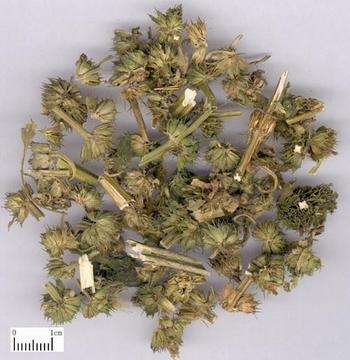Yi Mu Cao
The Processing of Yi Mu Cao
Origin
The airborne part of annual or biennial herbaceous plant Leonurus japonicus Houtt. of family Labiatae.
Location
Everywhere in China.
Harvest
Collected in summer when stem and leaves flourish and flower not bloom or beginning of blossom.
The actual smell and taste
Light smell and lightly bitter taste.
Best quality
Tender, flourish, gray green.
Processing
Unprocessed, processed with wine or made ointment.
The Effect of Yi Mu Cao
Property
Pungent, bitter, lightly cold; liver, heart and bladder meridians entered.
Actions
Activate blood and regulate menstruation, promote diuresis and dissolve edema, clear heat and relieve toxicity.
Indications
A. Various syndromes caused by blood stasis such as amenorrhea due to stasis, dysmenorrhea, and postpartum abdominal stagnant pain
This herb enters blood system and can move stagnant blood, dispel blood stasis, generate new blood and regulate menstruation. It dispels stasis and promotes generation without retaining stasis serving as a key herb used before and after pregnancy and delivery in gynecology. It is mainly indicated for various gestational and labor diseases caused by heat accumulation and blood stasis so it is named "mother-benefiting". When it is indicated for syndrome of blood stasis such as traumatic injuries, swelling and pain due to stasis and stagnation and chest oppression and pain, the actions of its activating blood and resolving stasis as well as swelling-resolving and pain-alleviating are shown. For amenorrhea due to stasis, dysmenorrhea, unsmooth menstruating, irregular menstruation, postpartum abdominal stagnant pain and lochiorrhea, it is used singly by its actions of activating blood, resolving stasis and regulating menstruation, for instance, Yi Mu Cao Gao from the Pharmacopeia of China (1985 edition). It is also combined with blood-activating and menstruation-regulating herbs such as Dang Gui, Chuan Xiong, Dan Shen and Ze Lan, etc.
B. Edema, dysuria
This herb dredges water passage and relieves edema as well as activates blood and resolves stasis. It is mostly suitable for edema resulted from water and stasis accumulation together. It is used singly or with diuretics such as Bai Mao Gen, Ze Lan and Che Qian Zi, etc.
C. Sore and abscess
This herb has the actions of clearing heat and relieving toxicity and cooling blood and resolving swelling. For sore and abscess, it is usually combined with heat-clearing and toxicity-relieving herbs such as Jin Yin Hua, Lian Qiao and Pu Gong Ying.
Dosage and Administrations
Decoct 10~30 g. Or make ointment and pill. Proper dose for external application. Smashed for external application or washed by its decoction.
